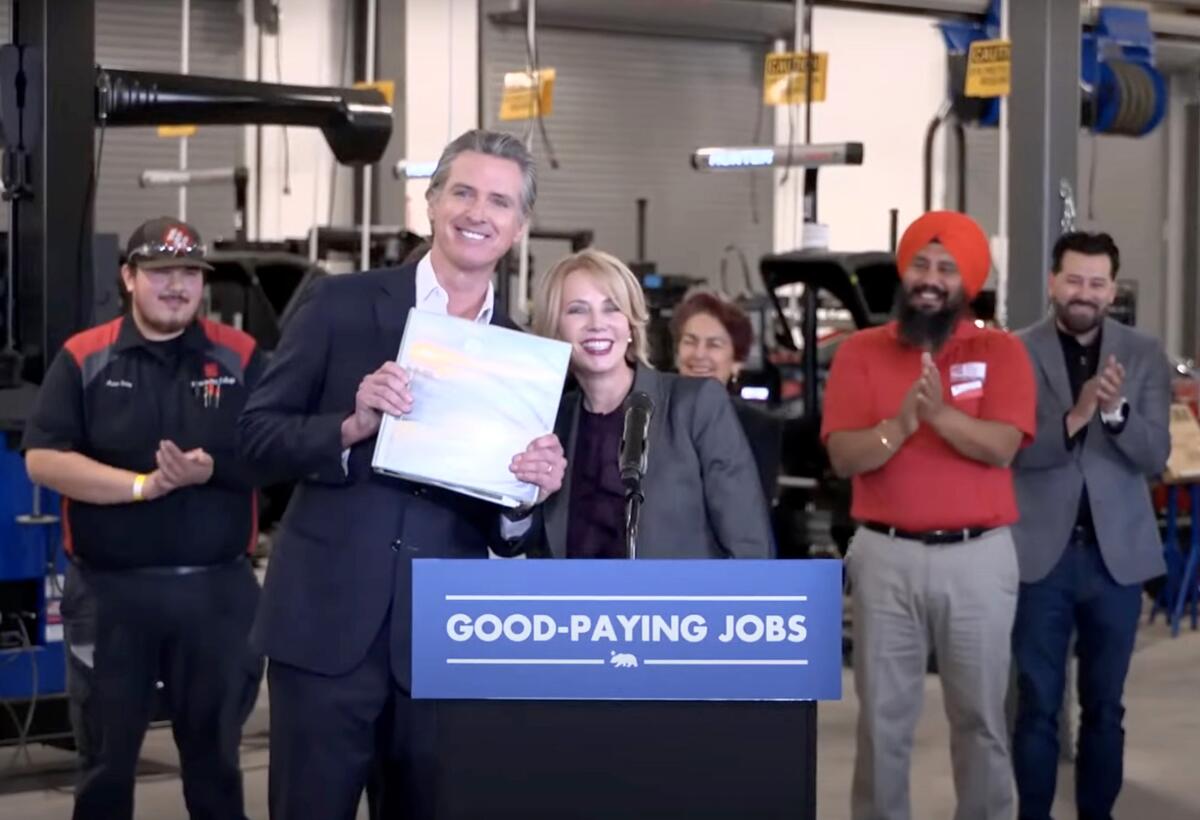
Gov. Gavin Newsom headed to the Central Valley on Thursday to tout his forthcoming jobs plan, saying California’s economic might was “cold comfort” to regions that feel like they don’t fully participate in the state’s muscular output.
The substance of the governor’s announcement was incremental. But the set piece — a liberal politician standing in front of heavy machinery, talking blue-collar jobs in a county that backed President-elect Donald Trump on Nov. 5 — appeared to be a response to the election, in which Democrats took a drubbing after critics said they were out of touch on economic issues.
“Some people talk about, ‘This economy is booming, inflation is cooling, lowest unemployment in our lifetimes. …’ All that may be true, but people don’t feel that way. They feel like the economy is not supportive,” Newsom said in an appearance at a Fresno community college, identifying that gap as a “point of emphasis” in the election.
Newsom characterized the work in places like the West Fresno campus’ apprenticeship program as an “antidote” to that economic disconnect.
During the last Trump administration, Newsom burnished his national profile by casting himself as a crusading foil to the then-president. He revisited those skirmishes in the days after the 2024 election, announcing a special session of the Legislature to prepare for potential Republican-led attacks on abortion rights, environmental protections and disaster funding.
The governor sounded some of those same notes while fielding questions Thursday, saying that Trump broke the law and “vandalized our progress” last time he was president.
But Newsom also walked a careful line, positing that he had worked more closely with Trump early in the COVID-19 pandemic than any other Democratic governor had, and saying that he didn’t care how his own constituents had voted.
“I care about Trump supporters. I care about RFK Jr. supporters. I care about Tucker Carlson supporters. I care about Charlie Kirk supporters. I care about Ben Shapiro supporters. I care about all people,” said Newsom, a Democrat who is widely seen as a potential contender in the 2028 presidential contest.
Hours before he spoke in Fresno, the governor’s political action committee, Campaign for Democracy, sent out an email to supporters, seeking feedback on “the steps Democrats need to take in order to claw back some of these losses in the next election and beyond.”
In a New York Times interview, Newsom said that he would soon be visiting deep-red Kern and Colusa counties, which are also in the Central Valley, and that he understood the message being sent by voters worried about their economic future.
Democratic political strategist Andrew Acosta said Newsom should have taken a clue from the mixed results in his own reelection in 2022.
“To me, there was a message sent two years ago when he lost in a lot of these same places by pretty substantial margins to a Republican who didn’t really run much of a race,” Acosta said.
Acosta noted that Newsom’s record had been used by supporters of GOP Rep. John Duarte in advertisements against Democratic challenger Adam Gray in the Central Valley’s nail-biter battle for California’s 13th Congressional District, which remains too close to call.
The governor seemed keenly aware Thursday that Californians — regardless of whether they lean red and listen to “The Ben Shapiro Show” or keep the radio dial in their Prius tuned to the airwaves of NPR — share a common concern: the cost of living in an extraordinarily expensive state.
A survey conducted in mid-October by the nonpartisan Public Policy Institute of California pinpointed the economy, including jobs and the cost of living, as the most pressing issue for state residents.
Those results held across geographic, party and demographic lines. But Central Valley residents had a particularly grim view of the state’s economic outlook, with more than two-thirds of respondents saying they foresaw bad times ahead in the next year. Central Valley residents were also the least likely to see hope on the more distant California horizon, with under 1 in 3 saying they thought the state was headed in the right direction, according to the Public Policy Institute’s survey.
Newsom said the seed of inspiration for his jobs plan was sown when he was lieutenant governor, and saw how the California dream had frayed in many places.
“I felt like coastal parts of the state were doing well, but at the end of the day, there was a different story that was being told all across the state,” he said.
The governor laid out the structure for his upcoming “California Jobs First Economic Blueprint,” which will be released in full early next year.
The San Francisco-bred politician has made a habit of sojourning to more conservative swaths of California after major elections.
In 2019, on his first full day in office, Newsom toured areas with a high fire risk in Placer County, a historically red section of Northern California‘s Gold Country. And he held a news conference with his wife in Fresno County shortly after winning reelection in 2022.